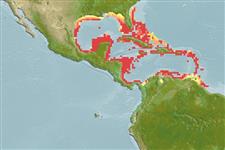Environment: milieu / climate zone / depth range / distribution range
นิเวศวิทยา
เกี่ยวกับทะเล,น้ำเค็ม เกี่ยวกับหินโสโครก; ไม่มีการอพยพย้ายถิ่น; ระดับความลึก 1 - 70 m (Ref. 9710). Subtropical; 33°N - 35°S, 99°W - 28°W (Ref. 55265)
Western Atlantic: Florida, USA and Gulf of Mexico to Brazil. Eastern Central Atlantic: St. Paul's Rocks (Ref. 13121).
Length at first maturity / ขนาด / น้ำหนัก / Age
Maturity: Lm 22.0 range ? - ? cm
Max length : 45.0 cm TL เพศผู้/กระเทย; (Ref. 4858); common length : 30.0 cm TL เพศผู้/กระเทย; (Ref. 3797); น้ำหนักสูงสุดที่มีการรายงาน: 1.6 kg (Ref. 26340)
เงี่ยงครีบหลัง (รวม) : 14; ก้านครีบอ่อนที่หาง (รวม) : 19 - 21; เงี่ยงครีบก้น: 3; ก้านครีบอ่อนที่ก้น: 20 - 21. Tail and pectoral fins entirely yellow. Black spot on forehead has electric blue spots and is surrounded by narrow, electric blue ring. Large blue spot at base of pectoral fin (Ref. 26938). Adults develop short spines on the margin. The color of large adults is purplish blue with yellow-orange rims to the scales; head above eye dark blue, below greenish yellow; mouth, chin, throat, chest and abdomen purplish blue (Ref. 13442)
Found on coral reefs. Generally occurs solitarily or in pairs. Moves gracefully between seafans, seawhips, and corals (Ref. 9710). Stomach contents of 26 specimens indicate that the species feeds almost exclusively on sponges supplemented by small amounts of algae, tunicates, hydroids and bryozoans. Young pick ectoparasites from other fishes (Ref. 9710). Marketed fresh (Ref. 3797).
Life cycle and mating behavior
วัยเจริญพันธุ์ | การสืบพันธุ์ | การวางไข่ | เซลสืบพันธ์ของเพศเมีย(ไข่) | ความดกของไข่ | ตัวอ่อน
Allen, G.R., 1985. Butterfly and angelfishes of the world. Vol. 2. 3rd edit. in English. Mergus Publishers, Melle, Germany. (Ref. 4858)
IUCN Red List Status (Ref. 130435: Version 2024-1)
Threat to humans
Reports of ciguatera poisoning (Ref. 30303)
Human uses
การประมง: มีการค้าเพียงเล็กน้อย; สถานที่แสดงสัตว์และพืชน้ำ: การค้า
เครื่องมือ
Special reports
Download XML
แหล่งที่มาจากอินเตอร์เน็ต
Estimates based on models
Preferred temperature (Ref.
123201): 24.2 - 28, mean 26.7 °C (based on 220 cells).
Phylogenetic diversity index (Ref.
82804): PD
50 = 0.5078 [Uniqueness, from 0.5 = low to 2.0 = high].
Bayesian length-weight: a=0.03162 (0.01614 - 0.06195), b=2.88 (2.71 - 3.05), in cm total length, based on LWR estimates for this species & (Sub)family-body (Ref.
93245).
ระดับชั้นอาหาร (Ref.
69278): 3.0 ±0.0 se; based on diet studies.
ความสามารถในการกลับคืนสู่ปกติ (Ref.
120179): ต่ำ, เวลาต่ำสุดที่จะทำให้ประชากรเพิ่มขึ้นเป็น 2 เท่าใช้เวลา 4.5 - 14 ปี (Preliminary K or Fecundity.).
Fishing Vulnerability (Ref.
59153): Low to moderate vulnerability (35 of 100).
Nutrients (Ref.
124155): Calcium = 23.7 [10.8, 43.4] mg/100g; Iron = 0.489 [0.281, 0.849] mg/100g; Protein = 19 [18, 20] %; Omega3 = 0.146 [0.085, 0.251] g/100g; Selenium = 17.6 [8.3, 37.8] μg/100g; VitaminA = 35.8 [8.6, 142.1] μg/100g; Zinc = 0.792 [0.515, 1.183] mg/100g (wet weight);
